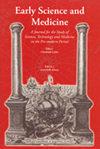La Luce (1698) by Giovanni Michele Milani – A Final Attempt at Reconciling Atomism and Religion in Seventeenth-Century Rome?
IF 0.5
2区 哲学
Q3 HISTORY & PHILOSOPHY OF SCIENCE
引用次数: 0
Abstract
In the poem La Luce, composed in 1685 and dedicated to Christina of Sweden, Giovanni Michele Milani propounds a mechanical and vitalist (meta-)physics of light that complies with Christian tenets by adopting a peculiar version of Democritean atomism. His lecture for the Roman Simposiaci Academy indicates the extent of Milani’s dissatisfaction with Aristotelian philosophy. While he attended the Physico-mathematical Academy and the heterodox Congresso medico romano, he nevertheless, signed La Luce – published posthumously in 1698 with a preface by Francesco Redi – as “Accademico Umorista.” When we examine La Luce together with some excerpts of the unpublished work of Milani’s friend and fellow member of this literary institution – the Dialoghi eruditi by Giuseppe Giusto Guaccimanni – we are presented with an interesting cultural scenario. It would seem that some Umoristi might have joined the Queen in the effort to devise a Christian experimental philosophy which was open to alchemy. The posthumous publication of the poem may well have been triggered by the rivalry between the Umoristi and the Academy of the Arcadia.《光明》(1698),作者乔瓦尼·米歇尔·米兰尼——十七世纪罗马原子论与宗教调和的最后尝试?
在1685年献给瑞典克里斯蒂娜的诗歌《光明》中,乔瓦尼·米歇尔·米拉尼提出了一种机械的、生机论者(元)的光物理学,通过采用一种特殊版本的民主党原子论,这符合基督教的信条。他在罗马辛波西奇学院的演讲表明了米兰尼对亚里士多德哲学的不满程度。尽管他参加了物理数学学院和非正统的罗马医学大会,但他还是在1698年去世后出版的《论路》上署名为“academico Umorista”,前言由弗朗西斯科·雷迪撰写。当我们把《路斯》和米兰尼的朋友兼这个文学机构的同事——朱塞佩·朱斯托·瓜齐曼尼的《博学对话》——的一些未发表的作品选段一起研究时,我们看到了一个有趣的文化场景。似乎有些乌莫里斯特人加入了女王的行列,努力设计一种对炼金术开放的基督教实验哲学。这首诗的出版很可能是由乌莫里斯蒂和阿卡迪亚学院之间的竞争引发的。
本文章由计算机程序翻译,如有差异,请以英文原文为准。
求助全文
约1分钟内获得全文
求助全文
来源期刊

Early Science and Medicine
HISTORY & PHILOSOPHY OF SCIENCE-
CiteScore
0.50
自引率
0.00%
发文量
22
审稿时长
>12 weeks
期刊介绍:
Early Science and Medicine (ESM) is a peer-reviewed international journal dedicated to the history of science, medicine and technology from the earliest times through to the end of the eighteenth century. The need to treat in a single journal all aspects of scientific activity and thought to the eighteenth century is due to two factors: to the continued importance of ancient sources throughout the Middle Ages and the early modern period, and to the comparably low degree of specialization and the high degree of disciplinary interdependence characterizing the period before the professionalization of science.
 求助内容:
求助内容: 应助结果提醒方式:
应助结果提醒方式:


